Hello everyone, welcome back to The Bilna Sandeep Show. Today on the show we have Mr. Pankaj, who is an author, a mentor, a coach and also the executive director of BNI Deira region. Welcome to our show Mr. Pankaj Gupta.
Watch the Podcast
Part 1
Part 2
Listen to the Podcast
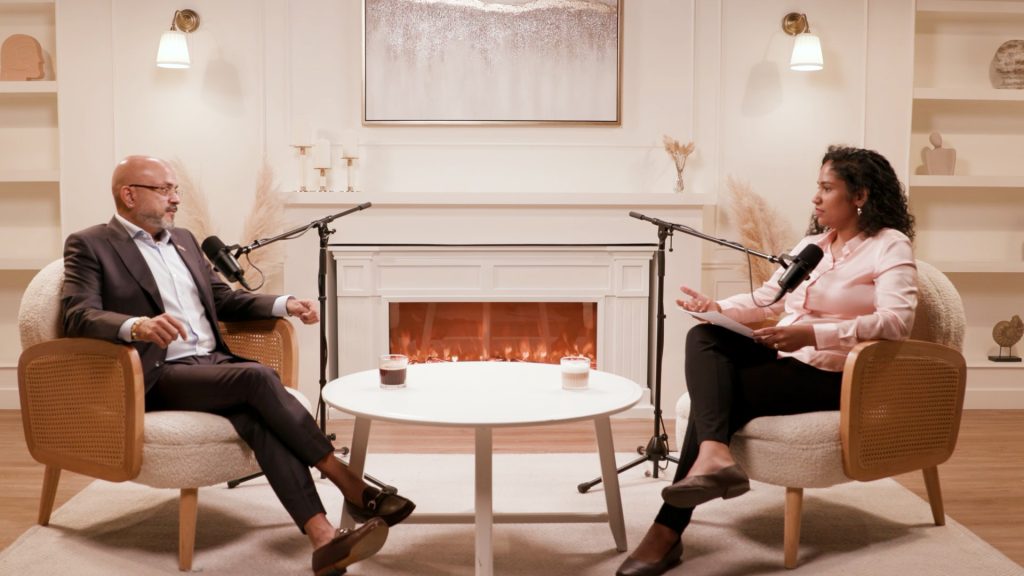
Pankaj: Thank you Bilna. Thank you for inviting me here today. It’s an honour for me.
Bilna: For us as well. I’m so delighted to have you here on our show. So, I was really fortunate enough to get a copy of Pankaj’s book, which is releasing soon. And the name of the book is ‘Being’. And I want to start off this episode with one line which I saw in the book, which was really amazing. So I’ll just read that out.
I’m a river who lives to nurture lives around me. I persist unceasingly, even if I must carve new paths. At times, I may be turbulent, while in others, I exude serenity, yet my flow shall forever endure.
Wow, that’s amazing, you know, that statement I’ve always like even before reading through the book, I’ve heard you say that as well, right? So how important is it to have a purpose statement like that for someone? And how did you come up with it? And how has it changed the way you see life?
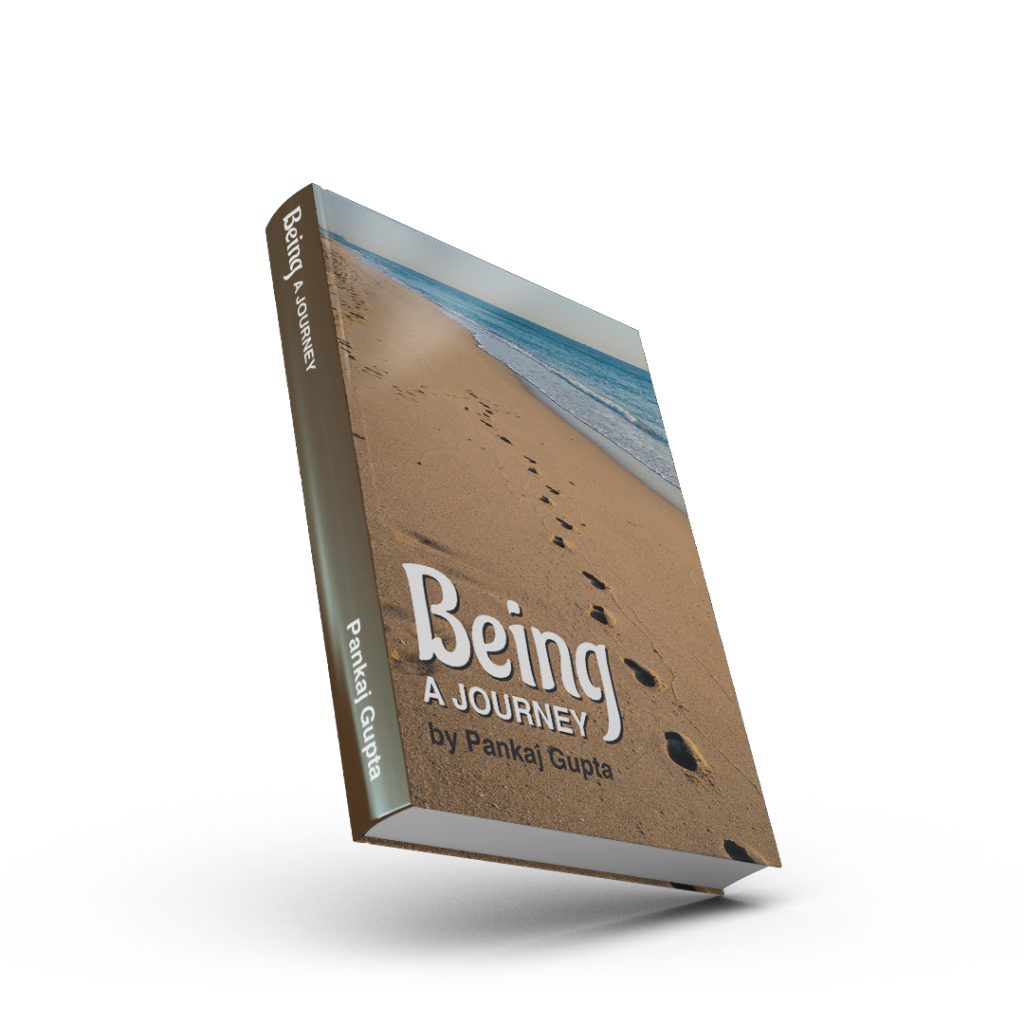
The Importance of a Purpose Statement
Pankaj: So, Bilna, when we talk about a purpose statement, many a time you will find executives feeling unfulfilled, feeling hollow, having everything around, but yet they are not satisfied. That authentic happiness is missing. And in my learnings, in my separate mentoring I received from different gurus, they always taught me this:
Having a purpose in your life is the most important, because then you can check back everything with the purpose, whatever comes your way, whatever you are doing, is that serving the purpose of your life.
We all live towards a purpose, knowingly, unknowingly. When we know the purpose, we can craft our way, we can really work towards that purpose. Indeed, the purpose is a statement which you have read. It was invented in something called co-active coaching. I was taking that coaching, co-active coaching and Gonan is the one who takes this coaching out here in Dubai, they helped us develop a purpose statement They connected this with our values, this is what are your values, and develop a purpose. So my initial purpose statement was:
I am the river Ganges, which flows, never stops. I can be turbulent, I can be loud. What I’ll do on my way is I’ll nurture lives in and around me.
This was the very first.
Bilna: That’s beautiful, I mean that itself was a very beautiful statement.
Pankaj: Because that’s my passion. You know, I talk to people,
BNI Deira and What It Means to Me
Pankaj: I get an opportunity through BNI to speak with so many people, and BNI taught me to learn from the life of members, learn from the life of us. You know, when we do an MBA, I always mention this, when we do an MBA, what do we study? We study different people’s case studies, right, life. Now, imagine if I learn from Elon Musk’s life, or I learn from Warren Buffett’s life, or I learn from, you know, some other big names. My point is yes, we can learn those things, but will those challenges which they have faced are going to come in my life? I’m a very small man, I’m a mango person, Aam Aadmi right? Now those mango people, where do I find those case studies of mango people? So when I sit down with you, you are a BNI member, I learn from your life, I see what challenges you face, how you go through life, does that give me enough learning? So I do a one-to-one, I do an understanding, a deep dive meeting with my members until I am able to collect a golden nugget from your story. That is what drives me towards my focus, because I am able to learn from you.
Bilna: It’s like everyone you meet is a learning for you.
Pankaj: It’s a learning for me, it’s a learning. So I never forget, I remember in my first grade when I was reading the storybooks, there was always one question after that, what is the moral of this story? So every human being is a story for me, their life is a story for me, I need to know the moral of their story which I am going to learn from. And when I grew up, another question which was added a lot later, somewhere in secondary schools, what’s the irony of this story? And believe me, I started collecting those ironies also in their stories. And that helped me mentor other people. So if I nurture other people, if I mentor as many people as possible, make a difference in their life, will that really solve the purpose? You know, very recently, something which I always ask myself came as a book title in front of me and I was amazed to see ‘Who will cry when I die?’. If I make a difference in your life and you get to know Pankaj is no more, will you have a tear in your eye? And if I am able to achieve that, that’s a success for me. So this was the initial, you know, one which I created the purpose statement.
Evolving as a Person
Pankaj: And then few years while I was living this, I was again in a session and somebody says Pankaj, isn’t it time that you improve, evolve this purpose statement further?
Bilna: As you evolved as an individual
Pankaj: You should evolve your purpose, right?
You should aim for a higher purpose. And there it changed to that I nurture other rivers, other leaders who intend to nurture the life of other people who came in their life. Will that bring a ripple effect? Will that bring a bigger change in society?
Bilna: So even if you nurture one person, he will go and nurture another five.
Pankaj: Yes, yes.
Bilna: Nice, nice. So that is I think it’s an amazing statement. And I have known you for like maybe like maybe one, one and a half years now. And I think I’ve really seen that happen through your workshops. And one more thing which I noticed during those workshops is that you are never scared to open up about your own weaknesses, your own failures. And I feel that it’s a very liberating thing to do because like when you are an open book, like when people know that this is what Pankaj is, there’s nothing to be scared of. But how do you first get that strength to talk about it openly with your fellow members?
Pankaj: I always go back to my childhood and I’ll always say we are mostly the results of our upbringing. We are always being told to never hide anything from your gynecologist or your doctor. If you hide things, can they treat you? So my question is when I am not open to being vulnerable, not open to my coaches, my gurus, the people who I want to learn with, will they be able to help me? If I hide all those things, will they be able to learn? Will they be able to help me? And then I came across a lot of coaches who I want to salute to. I want to give all the credit to whatever I have learned. So Brene Brown, she has spent a lot of lifetime just researching vulnerability.
My question is, can I be vulnerable? Okay, what will happen if I go vulnerable? The fear is somebody may hurt me. But I am the one who will choose if I want to get hurt by someone’s comment or not. If I am vulnerable, if I am accepting my mistakes out loud in public, why am I accepting my mistakes out loud in public? Because I want to learn from them, I want to grow up. I don’t want to repeat those mistakes.
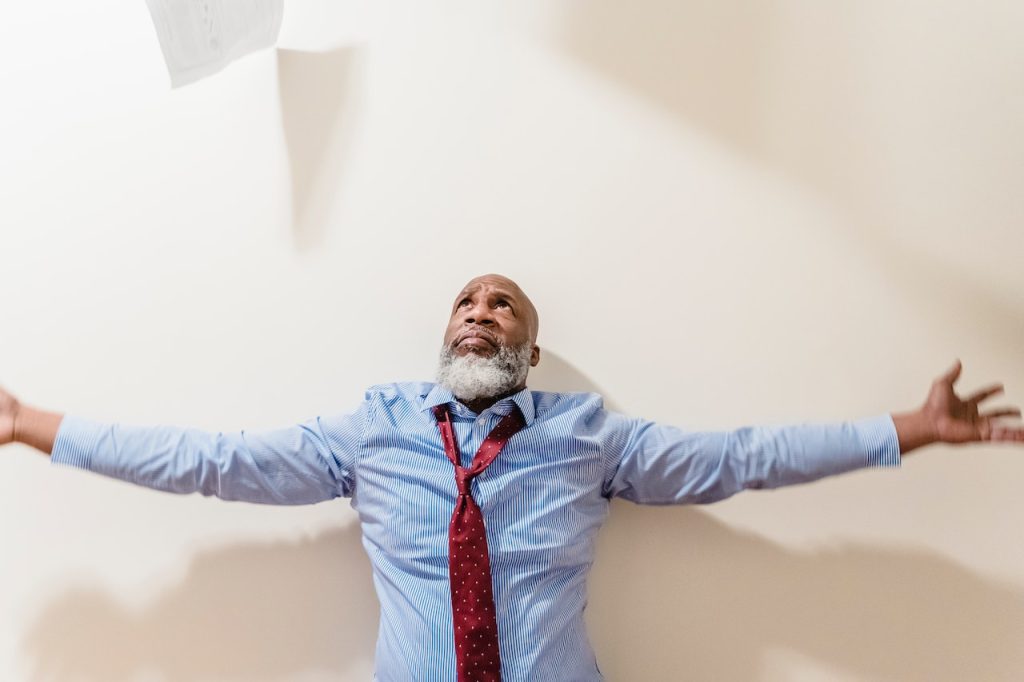
What is there to hide? What is there to hide? If I keep on hiding, no one can ever help me. My life is a complete result of the gurus, the mentors, the BNI members, the friends who have come in my life and who have taught me why they could teach me because I could open up myself. At some point of time, I have heard from people, Pankaj, you take too much risk telling people about that. I said, if I don’t take that risk, I will be where I am for the rest of my life. And that’s a bigger risk in life than taking that risk and finding my way forward in the right way, which can pave a beautiful future for me.
Introspection and its Importance
Bilna: True, true. And now coming back to the book itself, it starts with the chapter introspection, right? So what exactly is, you know, what is introspection and why is it important for a person?
Pankaj: You know, in this book, I’ll read something from that, not word to word, but something. So Milan is a gentleman who lives in Dubai, has a beautiful wife, kids, and a three bedroom sea facing apartment. He’s happy in all ways, right? But it still feels hollow. Why is that hollowness? That hollowness is because one, he does not have a purpose. Second, he does not introspect what he’s doing, why is he doing it? Right? Have you ever been to a mall? Yes. Right? You go to the Dubai mall, that beautiful map, and you want to go to that shop. And then you go into, you know, the category, you find that shop. And from there, you find the way. Yes. But if I remove that ‘you are here’. Right? Will you be able to walk that way?

Bilna: So you need to find where you are yourself first.
Pankaj: So knowing where you are is introspection. If you want to bring any change to your life, the very first step is where you are, where am I? Moreover, what am I doing? Why am I doing that? What is the purpose of that? And in introspection, I don’t even look at, you know, that’s not the only part which I look at, what I am doing, why I’m doing. I look at what I am not doing, which I want to do. And most importantly, what is the cost I’m paying for not doing what I want to do? Yes. Am I going to miss something which I can never get back? Understanding all those things will give you enough courage to make those necessary changes.
Not only that, it will give you pride in doing what you are doing, because you will associate a bigger purpose to your doings. Just an example I’ll share with you. A friend of mine told me that every Friday morning, I sit down with my kids and we do some shopping for them.
Bilna: Okay, like online shopping?
Pankaj: Online shopping, yeah. They’ll hunt. He has a three-year-old child and he’s hunting with him. Okay, what do you want to buy? And he said, I do that. Okay, why do you do that? I don’t know. I just want to buy him something. Okay, good. But, you know, when we keep on talking about that, we realise the purpose is to build that bond with the child, which is going to end throughout the life, which is going to stand there, because daddy used to spend time with me. That’s the value. When you add that bigger purpose to it, then it all makes sense.
Bilna: It all makes sense. Why are you doing what you’re doing?
Pankaj: When you do introspection, believe me, the things you are doing, they start making sense to you. Yes. Right? They start bringing fulfilment to you. Yes. There is nothing more important than your authentic happiness. I always appreciate your smile. That cannot come if you are not authentically happy. Yes. Right? And that’s what I drive in introspection.
Bilna: That’s amazing. And in your book itself, now talking about Milan’s story, there’s also a lot of instances you have put with a lot of people’s stories. And I think they are the real people you met in life. Probably you might have changed the names, but they are the real people.
Pankaj: Definitely I changed the name, but those all stories are real instances which have come through my life, where I learned from them or being able to help them think differently.
Bilna: And it was very connecting. So that’s what I felt about the book more than reading any other self-development books versus your book. I felt there was a very nice style of storytelling. It felt very relatable because there were a lot of stories of real people in it.
Pankaj: You know, here I want to say something. I am not an author. Yes. I am not a guru. I just share with you what I have learned in life. Nice. Yes, I go in a way of storytelling because according to me, whatever facts I say, they are just telling the facts. But when I tell a story, it lives longer with you because I try to tell a story in a way that my audience can resonate with. The moment they have that resonance, the energy in the room will change. They’ll have a shine on their face. And I know that they have found something which will help them hold this story for their life.
Good HR practices keep employees happy. Check out this episode with the D’Souza Sisters
Pankaj Gupta’s Workshops
Bilna: So, this Milan story was very relatable to me also. I had everything in a corporate job and at that time, I also went through a very similar journey which Milan went through. So the very first chapter itself took me like, wow, this is what I went through. So I feel a lot of people who are reading this would also feel. And one more highlight which I found in your book was that a lot of chapters end with worksheets or like exercises for you to actually sit and self-reflect. And another good thing is you’re also taking it to the next level through your workshops, right? So it’s more like once I read your book, and what do I take the next action, you’re also ready to hand hold us through your workshops. So I would love to know about those workshops as well, you know.
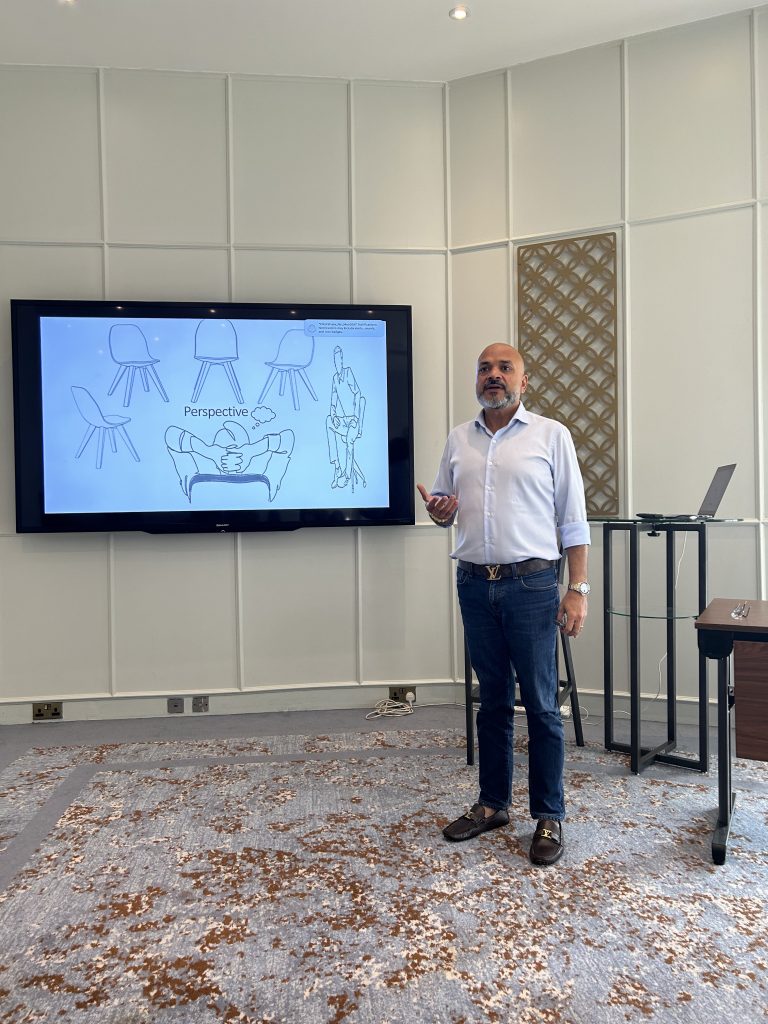
Pankaj: So Bilna, let me say it this way. What is my purpose? My purpose is to come back. My purpose is to nurture the leaders, right? By writing the book, yes, I will reach a mass audience. I’ll create some wow, some ah, some wow moment for them.
You know, we are all leaky buckets. If I don’t give those exercises and they don’t do those exercises, they’ll lose what they have learned. John Maxwell says something beautiful, learn it, earn it, and then return it. Wow. Right? So I may learn and forget. I may learn and practice. By practicing, I’ll earn it. Once I have earned it, what is my duty towards my society? Give it back to society.
So I am doing the same thing. Whatever I have learned and I have earned, I am going to return it. And because I have earned it, it is not a bookish knowledge which I am sharing. It is the story, it is the practical examples, it’s the something which has gone through me. Yes. Right? So it is coming from my core, not from what I have read or what I have heard. And you know, why am I inspired to do those workshops?
When I write a book, the audience will read. Yes, they will take actions and it will depend on how many actions they’ll take. But if I am able to do a workshop and have people in the room, it is soup for my soul. When I see that change in the energy, when I see that blink in their eyes, those transformations, it gives me energy to keep flowing, keep doing what I am doing. It tells me, yes, you are on the right path. Not only that, during those workshops, we can help these people do some help to each other. Right? In a group, we can really do much more than what we do alone. So guidance is required at times because we have certain limitations. And if we want to overcome those limitations, we have to hear what other people experience. I used to feel, you know, I had gone through downs in my life, literally from hero to zero twice in my life. And I always would ask, hey, God, why have you done that to me? Why me? Why me? Why me? And most of us do that. But when I come to these workshops and then I hear from other people, I see that God has given a challenge to everybody. Everyone has handled those challenges and we are all shining today. The trajectory of our growth was positive.
If the trajectory was positive, why blame God? We are here because those challenges came our way. Because we are here because we fought through those challenges. And that’s why workshops are very, very important indeed. Right now, I’m doing on this 28th, I’m doing the workshop for communications is the third chapter. And right now, these workshops, I’ve invited all my BNI members. And seriously speaking, making money out of these workshops is not my focus. My focus is to live the purpose of my life. And that’s what I’m completely committed to.
Benefits of Workshops for Corporate Wellbeing
Bilna: That’s amazing. Now, when it comes to taking those workshops to the corporate levels, right? So it’s the CEOs or probably the owners of a company or the directors of a company who want to invest in their employees, into their well-being, right? So as a CEO, what can I expect if I send my team to do the corporate training of the whole journey of being? What transformation can I expect in my people?
Pankaj: So I’ll take an example of a puzzle piece. The entire team of a company is the pieces of a puzzle. When put together in the best way, they look a beautiful picture. Right? What if these puzzle pieces have crooked edges? Right? Those crooked edges are the one which will get removed.
They’ll be more smooth. They’ll fit into the picture of that puzzle more smoothly. They’ll know what they are doing, why they are doing. They’ll be happy doing what they are doing. If they don’t meet the purpose of your company, the mission of your company, they might find something else. Yes, there is a possibility. But at the end of the day, you will have a team which is aligned, which is working with passion towards the purpose of that company.
Will you need that?
Bilna: Definitely, yes.
Pankaj: As a matter of fact, I’ll read a statement which I read from a book. I don’t remember the book’s name. A board asked the CEO, why do you spend so much money on the development of your team? What if they learn and leave? Okay. The only answer the CEO has, I am not worried about if they leave. I’m worried if they don’t learn and they stay. Do you want to have that kind of team?
That’s your choice.
Bilna: Very true. I think a lot of people don’t really understand the value of investing in their own team. Like you said, if they stay and if they don’t know what they are doing, it does more harm. Amazing. Again, when it comes to the readers, who is the right person who should read the book? Or maybe I would put it in a different way. Why did you actually write the book?
Who is this Book For?
For whom? Like when you write, you might have somebody in mind, right? Who should be the right person you are speaking to through the book?
Pankaj: You know, I come across a lot of BNI members in my life. These are SME owners; these are micro SME owners. Then during my learnings, coachings, I came across so many corporate employees and I always find them not satisfied. Okay. I always find a deep pain behind that smiley face.
And I said I have learned it. I have learned to be vulnerable. I have learned to come out. If I give this back to them, can they be authentically happy? So anyone who wants to be happy in life, doing what they are doing, has a purpose, really knows where they are going. The being means what you want to be at, you know, 50 years from now. And where are you driving your life to? If you want to have control of your life in your hand, if you want to really know where you are going, this is a book for you. So my audience, if you notice in every single chapter, I have referred to employees, right? The people who are working in the organizations, make them successful. And I have referred for employers or entrepreneurs. So this book is for both.
Bilna: Everybody, probably everyone who wants to really have a purpose and have a self-discovery.
Pankaj: You know, somebody recently, a friend’s wife, who I had given this book to read, and she’s a housewife, she read this book and she said, Pankaj, you know, I’m so deeply connected because so far I used to crib that Pankaj, you know, I am not able to utilize my learnings and I’m just spending my life as a housewife and I was feeling stuck. But reading the book, there was some realization on what I am doing, why I am doing. I have chosen this path because I want to shape up the future of my kids, right? And what I am doing, I am able to associate a purpose to that. That has given me peace.
Bilna: Very true, yes.

Self Communication: Why?
Pankaj: Even that matters. This chapter, if you see the first five chapters of the book, indeed, not only five, six chapters of the books, goes towards your personal thing, you as a human being, you as an individual. Because for me, somebody said, Pankaj, this doesn’t talk about the business thing. That is until you yourself are not in the perfect shape, mind and condition. How can I fit you into a business puzzle? Yes. Right. So let’s work on you first. Once you are complete, you know, beautifully, you’re decorated, you’re done. Everything is in order. We’ll talk about business. And then in the last four chapters, they talk about the business or the career. How do you plan your life? You know, so I have a chapter which is focused on the mission and vision of a company. I have a chapter which is focused on accountability. There’s a purely a term I learned through my BNI journey, accountability partner, right? So that’s how I have been driving it for everyone. And there are chapters, you know, like communication. This is something I say it is not only for adults, even teenagers if they learn. This chapter of communication, it can be a life changer for them.
Bilna: The way you talk to people can change your life, right? So is that what the communication chapter is going to be about? Like the workshop, which you’re also going to.
Pankaj: I love the way you have put in the way you talk to people, it changes your life. My question is the way you talk to yourself.
Bilna: So that is what more about it, right?
Pankaj: Right. To start with, how do you talk to yourself? So I used to say, you know, look at me. I used to say I looked like a Hitler, right? That was a bad word I was using for myself. Right? Then a coach of mine said, Pankaj, don’t use harsh words to yourself. Okay. If people are not able to match your energy, because of your passion, your level is so high in the room. See, oh yeah, you know, my energy is so high. That’s okay.
Bilna: Which is the positive side of it.
Pankaj: Positive side of it. Are you there to kill people? No, then why are you using that terminology for yourself? So it all starts here. You know, when I was coming to the studio to have this session with us. I was just discussing among myself what I was going to talk about. I didn’t know what you would ask, but I was going through my book topics and things like that. So, am I communicating with myself? Yes. Before every single communication, we communicate with ourselves.
Having control of that communication and control in the word, positive psychology. Put a positive psychology to that. And if you put that positive psychology to that, how will you communicate with people? That communication will improve. And most importantly, there is an art in understanding your audience. When I know my audience, I am able to select the right words for them. In my business career, what I have done is if I am sitting with a textile merchant, I will take examples from a cloth. Okay. Right? If I am sitting with a videographer, I will take an example from the videos. So you need to find the resonating things for them, right? Yes. And that will ensure that what you want to deliver will land smoothly. There is a big gap in what I want to say and what they will understand.
So, the perceived message. Yes.
So, I say that communication is three-faceted. One is internal communication, how you think, how you plan, and what you do. Second is how you deliver that. Yes. And third is how it is perceived.
If it is not perceived well, however good an orator I am, it is a failure. It doesn’t serve the purpose. Right? I need to ensure that it is perceived well. That’s the end purpose of this communication. If it is not perceived well, or how I want it to be perceived.
Bilna: True. And since you mentioned the term Hitler, I also remember the conversation we had before, right? People used to call you Hitler in one of your previous organisations. You were good at making the tough decisions, which was right for the company, right? So, as a leader, what is your advice when you are stuck with moments where you have to make tough decisions, probably you might have to terminate a few people, bring in new talent or whatever, restructuring. So, those tough decisions, how do you empwer leaders to make such decisions?
Pankaj:
Always look at the bigger picture. If you are running an organization, the organization is the bigger picture. Yes. If you are running a family, the family values are a bigger picture. Yes. If you are making a harsh decision on yourself, your purpose, and your values are a bigger picture.
True. Right? If I am letting go of a friend because that friend doesn’t resonate with my values, or where I want to drive my life to, and that friend derails that entire purpose, I am letting them go because I want to live for that bigger purpose. So, there is nothing bigger than the purpose of that moment. What is the purpose? Then there is something called, right now, I am reading a book these days, it is called Supportive Accountability.
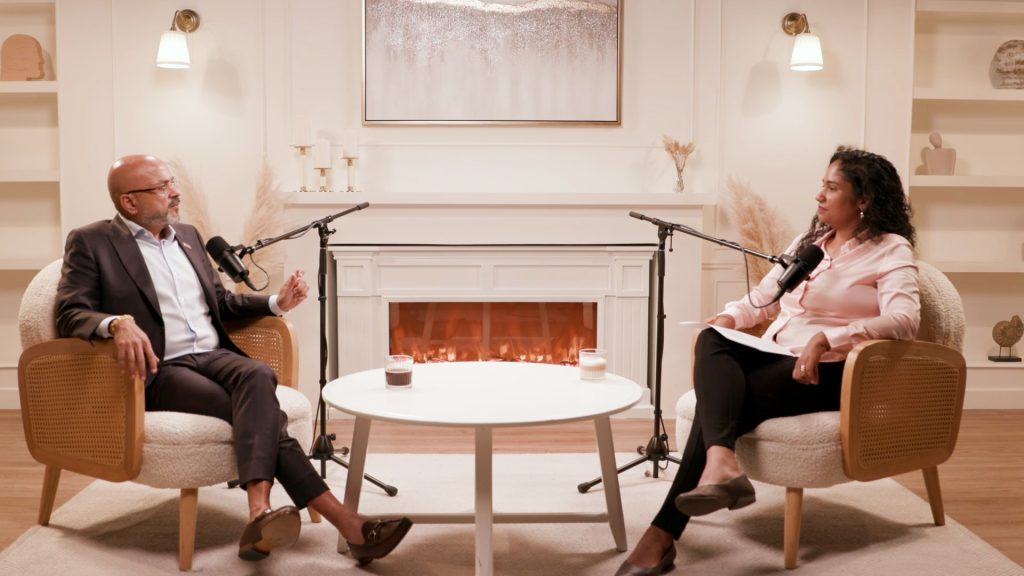
Supportive Accountability
So there are four different phases. So there are people who are providing you with support and accountability. There are people who are holding you accountable, providing no support. There are people who are providing you too much support, but not holding you accountable. Believe me, most of us are in this phase. We are providing all the support to our team, but not holding them accountable. End of the day. Do you know why?
Because we want people to please people, we want people to like us. End of the day, what will we do? We will kill the organization. The bigger purpose is the organization. Yes. What are you holding the organization? So, for example, in a BNI chapter, right, process and people, process and accountability. It needs to be balanced. Yes. Right. What is the bigger purpose?
Yes. If you have somebody who you are not able to mentor, who you are not able to, or who doesn’t match with the ethos of BNI or the chapter, do we let them go? No. Yes. Why not?
Bilna: I mean, I don’t know. It depends on the situation of both, right?
Pankaj: Situation, right? So, we have to see that the bigger purpose is supported. Yes. So, we have to hold people accountable and provide them enough support. Balance of everything is important. Now, bring that back into the family.
Pankaj: How about kids? You provide them with everything they need. But you don’t hold them accountable for their only job, which is studying and working on their sports and growth. So do you hold them accountable?
Bilna: We do. In a not as an accountability, we don’t say that, but we do in different ways.
Pankaj: But at the end of the day, it is accountability. My statement with my kids was very simple. Guys, your job is to study. My job is to provide for you. I will provide for you as much as I can.
But you have to do your study. If you don’t do that, then I will hold back. We’ll sit and talk, right?
So if you need to really groom everything in a better way, love, passion, and compassion, all is good. But at the end of the day, if you just imagine if I keep providing support and passion and love to my child, but don’t hold them accountable, what am I doing? I am spoiling their future. Their future, yes. Believe me, when they grow up, they’ll come back and tell you that you did not hold me accountable, mom. And that time you will have nothing to prove. You can’t say, son, I loved you too much. This is why I let you fail. Right? And today you are failing in your life. No, you have to hold that, and balance it, right? Balance everything and life will be beautiful.
Bilna: Now, also coming back to the Aam Aadhmi concern, the mango people, right? There are people who are not leaders, who are living like, you know, probably they have boasts or leaders about them, right? And especially in Dubai, there’s a lot of stress. There’s a lot of different kinds of pressure, work pressure, probably the traffic or whatever, right? So life is, there’s a lot of stress. What’s your take on stress? I remember the discussion we had about stress before, right?
Learn all about star architect Rashiq and his journey here!
Stress Elimination and Personal Growth
Pankaj: So, you know, my take is a bit harsh on this. Yes. One is, I am against using the word stress management. I want to manage things in my life which I want to have. Right? I want to attend a stress management course, provided I am ready to have some stress. Yes. I would rather have a stress elimination course. And what I say is, when you take charge of your life, when you introspect, when you know what you are doing, when you clearly see how you communicate, how you plan, you can take the steps and you can take charge of your life. When you know the purpose of doing what you are doing, what is there to stress about? Okay. Now you find yourself in a situation where you are in a job and the person above you, your boss, is not the right person for your life value. Yes. Then it is time to change. Right? Yes, there can be some time you will need to make that shift. But why do I feel stressed? Can you do anything about that?
What you can do is, you can be proactively looking for a right job. In that time, you can accept the fact that I need to deal with this person for the time I get my job. And grow your skill set.
Bilna: Temporary part of your life.
Pankaj: Temporary part of your life. The stress comes from not accepting what you have. Stress at times comes from, you know, not having control on your desires. Stress comes from not having control on your desire. Today, I have a car and I feel happy with that. Right? Yes. Then I see a bigger car passing through me. And then I am not happy about my car. If I keep doing that, I will reach no place.
Bilna: More like when you start comparing things which are not in line with your…
Pankaj: No problem. If you compare, no problem. You aim higher, no problem. But the moment you start cribbing for it.
Right? You are where you have driven your car to. If I am at a certain position in my life, this is a result of the actions I have chosen to do. If I need to reach a higher place, I need to take better action. Aiming is one part. Taking the actions towards that. So I talk about, you know, a chapter in accountability. I will talk about the plan. Milestones.
What will you do? And at times people get cribbing whenever they say, okay, where do you want to be one year from now? They’ll say, okay, we want to be 4X. Okay, very good. Where do you want to be after three quarters from now? 3X. Where do you want to be after two quarters from now? 2X. Where do you want to be at the end of this quarter? 1X. What are you going to do today to reach that 1X? That nobody has an answer. Why?
Oh, Pankaj, how can we plan that long? Then I have a picture. When you were a baby, your mom held your hand and put you on the pedestal number one, which was grade nursery, pre-nursery, right? And then from there to nursery, to KG, to grade one, to grade 12, and then the college and the post-grad. We are all the result of 17 years of planning. Right? And each year has a syllabus. Each of that year has milestones.
Each year has examinations. And we have all gone through that. And yet we claim we cannot make a plan for our growth now. Why? Because you are out of the academic cycle.
Bilna: I think once you are out of this college, people lose like, okay, I still need to keep learning. That doesn’t happen.
Planning and Time Mastery
Pankaj: And that’s where we say, come back. Let’s introspect. Let’s plan. What is the plan? What are you going to do this week? Where will you be after a month? After two months? And if you plan and live your life like that, you enjoy it. Right? So didn’t you enjoy your school life? Definitely. You did, right? Though you were living in a plan. At times when I talk about such planning with people, they would say, Pankaj, you’re talking to us like we live a machinery life. Boss, life is a machine. Life is a machine. We wake up, we sleep, we eat, you know, we do everything. So put everything in a plan. I have a movie time on my calendar. Right? I have a game time on my calendar.
I have a meditation time on my calendar. Why can’t you put everything on your calendar? And I have a chapter in this book which is chapter number four, which is time management. Organize your time to find time for everything in your life. We don’t organize our time. And that’s the challenge. When you start using a calendar, you will always have time for everything. We just don’t want to do that.

Bilna: True. I mean, it’s like we feel like somebody is controlling me, but it’s actually you yourself that has put that in the calendar.
Pankaj:
So it’s a simple thing. Either you control yourself or somebody will control you. Right? So my book of the journey to your Being is giving you the steering wheel of your life. You will be in charge of your life. You will have control of your life. Yes, turbulence will come. Yes, you will take detours, but you will know where you are reaching.
At least you would not be somebody who is sitting in a plane going to Germany wherein you want to go to the US. And once the plane lands, you say, oh, this is not where I wanted to plan to. True. Right? So take charge of your life. And that’s what the ‘Being’ book is all about. Amazing.
Bilna: Now, I’m sure every experience in the book is from your own life, the people you have met. You also mentioned your own life where you had to go to zero.
So maybe when you look right now where you are, versus what you were at that time, right? How was that emotional journey? Do you feel like you are now a more, what do you say, would you have dealt with the situation better if it was now versus then?
Leadership and Empathy: Pankaj’s Life Experiences
Pankaj: Definitely, I would have dealt with it better. If you talk about an emotional journey, again going vulnerable, I would not shy saying that I had sat in parks and cried.
Right? Because I worked in the US. Then I came to India. I tried doing business. I lost everything I had. And then I had gone through a really, really tough journey. I had to sell my car. I had to sell my laptop. I had to sell the ring in my hand. Because I had to run the show. The only thing I know is that I have to keep working, keep working, keep working. And then the turn came.
So all that downward journey has taught me something. And I am the result of my downward journey. Rather, I need to be more cautious now because when I come up, I become hard. When you come through the J-curve, it becomes more and more hard. And then when I find people who are going downward, I shall not react hard. I shall feel and remember the feelings when I was falling down.
It might be their first time ever. They might be going through that pain. Yes, I have come through this. So I will say, oh, I had come through. They can come through. But I learned that in a BNI meeting, I passed a comment in a BNI meeting, oh, what if they are going down? They’ll come up. Believe me, a lot of people, it was during COVID, a lot of people felt hard. And then a coach from BNI, she consulted me. She point blank asked me, you have fallen in life multiple times and you had come up.
Yes, you remember those moments when you were falling. You remember those times? Yes. Were you as hard as you are today? No. Then how can you deal with those people with that hardness? You have to remember that. Feel their pain. Hold their hand with empathy and bring them up. And that was a learning experience for me. So, you know, connecting with people, being able to touch their heart, their core. There is no bad person. I don’t hardly see. I would rather like to say that there is nobody who does anything intentionally wrong. It is the situations which make them do that. If you understand where they are coming from? The way they grew up and the circumstances they went through. You can always work with them. Yes, you will need their acceptance to work with them.
Introspection is the Key
And the introspection again, I’ll come back to the start of the book. Introspection is the key for them to understand that they should be open to work on their journey and take charge of their journey.
Bilna: I’ve heard this saying like you can only take the horse to the water, but the horse has to decide if it needs to drink the water or not, right?
Pankaj: That is very, very true. That is very, very true. And it’s the most challenging part for the leaders. Where you say, I have brought in the horse to the water. If it is not drinking, what do I do? That’s where the coaching, that’s where the touch, that’s where the emotion comes. If the horse is not drinking the water, they are stubborn. You are not able to explain to them, touch them, connect with their feelings, why they want to kill themselves, why they don’t want to drink water. Is there something wrong with the horse? So has anybody ever hugged the horse and given them that Jaduk-e-Jhapi from Munna Bhai MBBS and understood their pain?
If you understand their pain, you might be able to mould them and get them to drink water. That’s where true leadership comes into the picture.
Bilna: I think that’s one of the toughest parts of leadership, right?
Pankaj: That is where you have to lose yourself and deep dive into their life, understand from them. You know, what is the most important part?
Everybody on this earth craves to be heard. And leaders, at times, we fail to hear our people. If we give them the space to hear and really meaningfully listen to them, what are they facing? Why are they facing this? 90% of the time, we would be able to turn the tide around, turn the ship around. And you will see, believe me, the horses which you would be able to touch like that, they will become your superpower. They will become your superpower.
Bilna: That’s amazing. I think it’s more about, like, when it comes to a business point of your life, I think it’s all about how you can transform people, right? If I were the CEO or the leader of my company, I would need to transform the people, especially the people who have that hard shell around them. If we can get them to change or get them to understand themselves, not understand the company vision or anything. I think that is where the point starts.

Pankaj: You know, when you mention hard shell, we’ve been from India, we’re always here. He’s like a coconut, hard outside. I have a turtle at home. He has a hard shell, but inside he’s so soft. Why are they soft? Why has God given them a hard shell? Because they are soft inside. Their circumstances have given them that hard shell.
They are scared of letting anybody enter that shell. When we go with empathy, when we go with that compassion, and if we are able to enter their hard shell, believe me, you will find a very, very mellow person. Having said that, as a leader in a company, we are always in that situation; we’ll always find people. Yes, how much time can we spend on that? How much money can we spend on that?
It all depends on where we are in our life journey. We might also be facing some challenges. We might also need to be heard. So, as long as we are serving the purpose of being heard from each other, it will resolve most of the problems.
Continued Lifelong Learning
Bilna: You are one person who likes to keep learning always. I’m sure you read a lot of books, a lot of coaches. If you were to pick one person who’s inspired you in and out, who would that be?
Pankaj: You know, if I say one is difficult, because I certainly believe that small, small learnings from every single person. So I learned something from BJ Shah. I really admire the way he has the patience to listen to people.
I’m still far away from that level. And that’s what inspires me a lot. I had my first mentor in BNI. His name was Madhup Dukarnia. The way he was organized, right? And the way he would communicate point to point to you. That is something, again, a different level. I’m yet to reach that level. Then Chiranthan Joshi, I always talk about him. Chiranthan is a businessman, who has come from a modest background, started here and reached two levels here. He was my coach. He taught me something called servant leadership. He said, Pankaj, BNI is all about servant leadership. So servant leadership is you first, my members first. That is remarkable.
Then, you know, I met this gentleman, Munir Sabnani. He was my NLP coach. His life itself is a story for a lot of members to learn. I appreciate the way he has grown up, his kids. It is, if I bound myself, my executive coach, Neeru Sharma, I was a book hogger, bookworm, let me say. I will read a book like a course book. And from there, she put me to a book hogger. She would say, keep a book everywhere. So there’s a book in my car, there’s a book in my coffee table, a book in my bed, headrest, all the places. I’ll pick up a book, read four pages, get a nugget, move on, and then read that book again. So that actually, you know, explored the horizon of my learnings. Today, in a day, I might be learning one leadership book and one finance book and one social media book. And, you know, that gives me a lot of openness for different kinds of learning.
And I certainly believe that if I don’t grow and if I don’t learn every day, right? How would I nurture my purpose? How would I nurture those leaders? So I need to learn. Every time somebody meets me, if I’m not able to give them a new nugget, then I’m a failure. So I have taken this path of a river and a river has to keep flowing. Or to maintain that flow, for me, the current comes from the learning. And that’s what I’m doing.
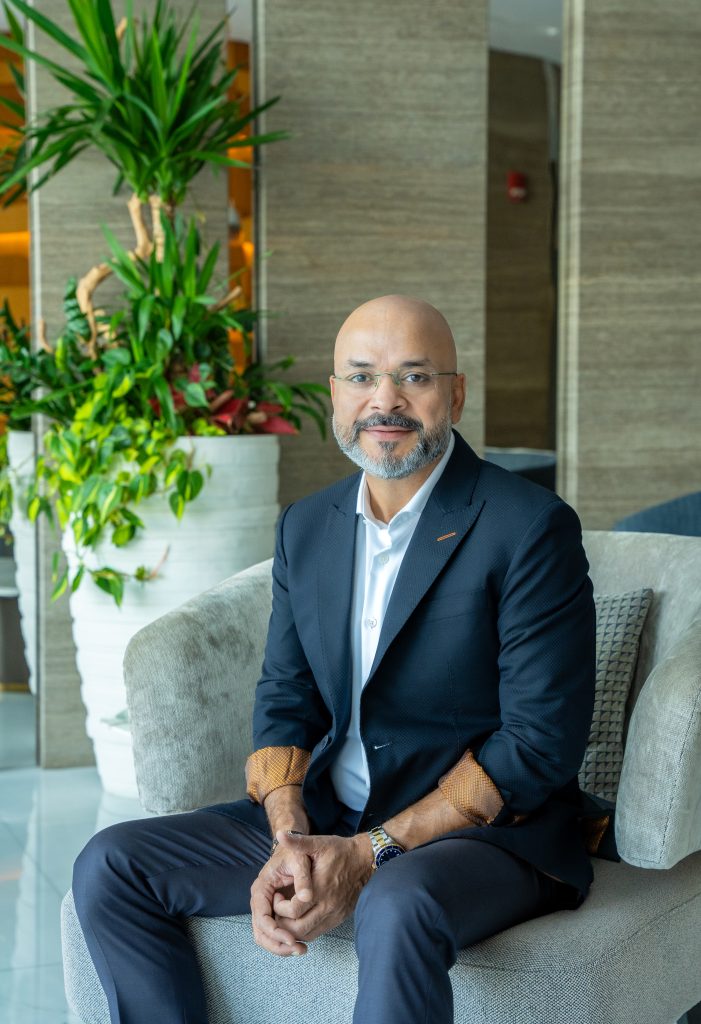
Pankaj Gupta’s New Book: ‘Being’
Bilna: Very good. I think that is where the river is originating from. And now to wind up our session, the last question, right? The book is coming out in October. And once I read your book, right? What should I do after that? What’s the next thing to do?
Pankaj: See, first is introspect. Go with the first chapter deep dive.
Second, go through the chapter by chapter of the book and take it as an exercise for yourself. Don’t jump on to the second chapter until you have done the exercises of the first chapter. And in case you need to find help, feel free to contact me. For me, seriously, I am out here in public. Money does not matter, right? It’s a simple thing. If you’re an individual who can benefit from having a session with me, and you can offer me a coffee, I’m okay with that. If you are somebody who can afford it, good. Because my purpose from this book or this workshop is not making money. I am completely bound myself with the association. And the proceeds from the workshops or things will go to a charitable cause. To some association in India, which helps operate the world problem in the hearts of very young kids.
That’s my core purpose. So I am not inclined to make a profit out of that book. God is kind. I have businesses which are serving that purpose. This book, this workshop is entirely to live by my purpose of nurturing people. That’s what I’m here for.
Bilna: Amazing. Thank you so much.
Pankaj: Thank you.
Bilna: For our listeners, you can look at our show notes to see how you can buy the book or how you can contact Pankaj.
Bilna: We’ll be leaving all the links in the show notes. Thank you again and see you again in the next episode. Thank you.
Pankaj: Thank you, Bilna.
Pankaj Gupta’s Links
LinkedIn: https://www.linkedin.com/in/pankajgupta08/
Instagram: https://www.instagram.com/pankaj.gupta08/
Website: https://pankajgupta.me/ and http://www.questmindcoaching.com/
Book to be launched in October 2023


